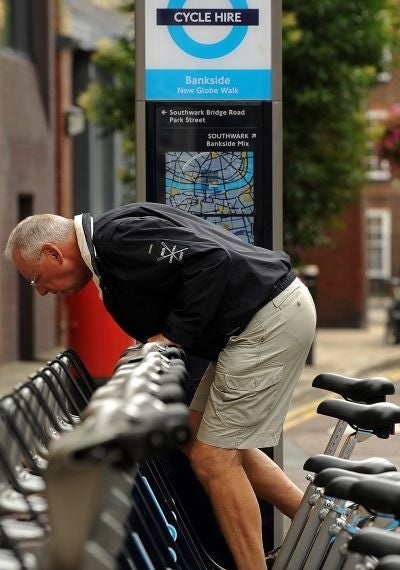Your support helps us to tell the story
From reproductive rights to climate change to Big Tech, The Independent is on the ground when the story is developing. Whether it's investigating the financials of Elon Musk's pro-Trump PAC or producing our latest documentary, 'The A Word', which shines a light on the American women fighting for reproductive rights, we know how important it is to parse out the facts from the messaging.
At such a critical moment in US history, we need reporters on the ground. Your donation allows us to keep sending journalists to speak to both sides of the story.
The Independent is trusted by Americans across the entire political spectrum. And unlike many other quality news outlets, we choose not to lock Americans out of our reporting and analysis with paywalls. We believe quality journalism should be available to everyone, paid for by those who can afford it.
Your support makes all the difference.Amsterdam may be often cited as the bike-friendliest major city in the world but Buenos Aires hopes to catch up. The capital of Argentina is creating new bike lanes and offering parking lot spaces for bikes, and now 40 hotels in the city are offering their guests and employees two-wheeled transport.
In a story published in El Cronista, an Argentinian newspaper, on October 13, hotels also plan to hand out maps and information about safe cycling in the city, which can be tricky in congested areas. High-end hotel Park Hyatt lends bikes to guests along with a picnic kit, while environmentally friendly Casa Calm has announced its plans to purchase bikes for employees.
In a move for cleaner, less-trafficked cities (and in turn healthier, fitter city-dwellers), other cities have been weighing pedal power as a serious option. Politicians in New York are considering physically separated bike lanes in the Big Apple, and a bike-sharing scheme, similar to the Velib in Paris or Cyclocity in Japan, has also been proposed. In addition, Washington, DC, is the latest global capital to enlist the bike-sharing scheme, with London inaugurating its service in July. Even more inspired is Copenhagen, where bikes already make up more than 50 percent of its traffic. The city is undergoing plans to build special highways dedicated to bikes.
Although the population of Buenos Aires is 3.1 million, each day 12 million workers, tourists, and students flood the city - bringing along eight million cars and buses, accounting for 60 percent of the total number of automobiles in Argentina. According to the US Energy Information Administration, Buenos Aires has, like many major Latin American cities, struggled in the past to curb the level of automobile emissions through stronger regulations and public transportation planning.
If the new plan proves successful and more people opt for bikes, the health benefits might not be overnight for the cyclists though, as drivers need to adapt to sharing roads with cyclists. And high pollution levels are likely to discourage cyclists, at least initially. A study released in June by the Transport Research Institute at Hasselt University in Brussels revealed that cyclists inhale around five times more toxic nanoparticles than pedestrians or car drivers; these toxic nanoparticles have been linked to heart disease and increased susceptibility to asthma attacks. However if cycling grows in popularity, it can be a means to reduce car traffic, congestion, and pollution in a city like Buenos Aires.
For tips on how to ride safely in cities: http://bicyclesafe.com/

Join our commenting forum
Join thought-provoking conversations, follow other Independent readers and see their replies
Comments